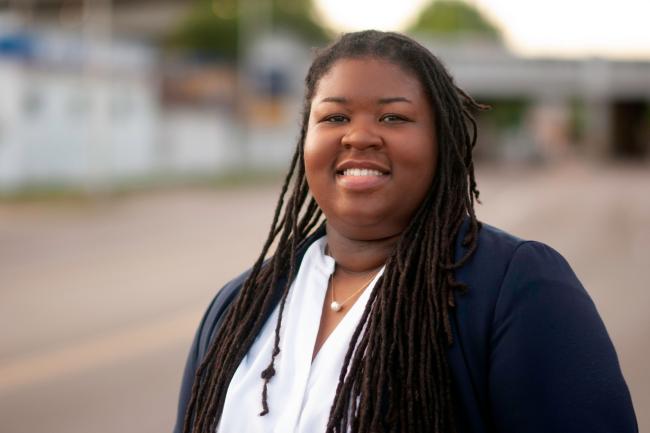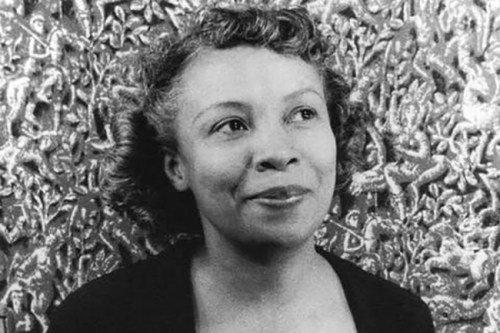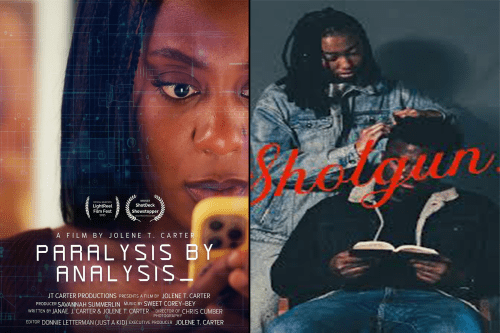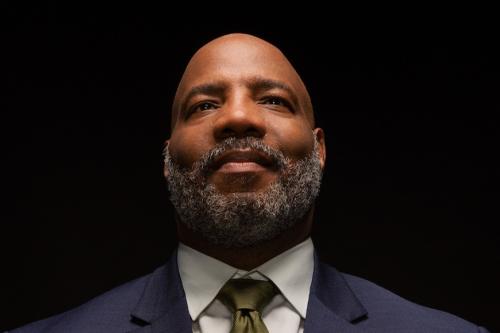Amidst a landscape where faith and identity often seem at odds, Amethyst Holmes, M. Div.’24, emerges as a trailblazer in a world where diversity, equity, and inclusion measures are being challenged and revoked.
As an LGBTQ+-identifying divinity scholar with a background in journalism, Holmes’ work centers around the intersections of faith, race, sports, and culture. She has dedicated her life to bridging these seemingly contrasting aspects of human experience. In this question-and-answer session, Holmes shares her journey, insights, and hopes for the future of religious scholarship and inclusion.
This interview has been edited for length and clarity.
Can you tell us about your personal journey of reconciling your LGBTQ+ identity with your faith? What were some of the pivotal moments or challenges you faced along the way?
AH: From the time I was in elementary or middle school, I knew there was something different about me. I grew up in a Black Baptist church in the Deep South that, in my memory, wasn’t vehemently hateful toward LGBTQ+ folks, but wasn’t explicitly open and affirming either. There was mostly an understood silence. I was in my early twenties when I named my queerness out loud for myself. I rediscovered my identity while serving on a ministry staff, one that was unquestionably non-affirming. God is funny like that sometimes. There were some friendships I had to grieve and set boundaries for to ensure my emotional and spiritual safety, but God’s love and acceptance of me wasn’t something I questioned. I grew up going to church nearly every day of the week, so the way some faith leaders have used scripture to justify hate and demonize LGBTQ+ folks always felt so incongruent to the truth of who God is and who I know God to be. I wanted to commit myself to studying a text that animates so much of my life as well as how it has influenced our broader society and its implications.
What role do you see yourself playing as an advocate for LGBTQ inclusion within religious communities? Could you share some of the initiatives you have led or supported to promote inclusivity and affirmation?
AH: This latest backlash of anti-LGBTQ+ legislation and trans antagonism across the country is tied to the rise of religious extremism. I want to support ministers who debunk harmful myths and narratives about our LGBTQ+ community members by encouraging them to discuss these life-altering bills with their congregations, converse with their queer neighbors, and organize with like-minded faith-based groups. There are many organizations like Pride in the Pews, The Fellowship of Affirming Ministries, and Q Christian Fellowship and others outside of the Christian tradition that I see myself continuing to support.
How do other aspects of your identity, such as your race, gender, or cultural background, intersect with your LGBTQ+ identity and influence your work in divinity?
AH: All my intersecting identities show up in anything I do, and I continue to show up as authentically as I can. My Blackness, woman-ness, Southerness, and queerness all help me ask better questions of Biblical text. My identities widen the lens I see scripture through, leading to deeper theological understanding, greater humility, and more compassionate ministry. Pauli Murray (J.D. ’44, H. ’17) often comes to mind when I think about what it means to be an embodied person. Their work as a lawyer informed her ministry as an Episcopal priest and vice versa. Her legacy motivates me to be courageous, sincere, and defiant. Seeing their class picture on the wall on my way to Dunbarton Chapel is a small, present reminder to keep going.
What are some of the specific challenges you have encountered as an LGBTQ+ scholar in the academic world? How have you navigated these challenges, and what support systems have been crucial for you?
AH: Thankfully I’ve experienced openness from my colleagues and professors who enthusiastically encourage me in whatever work the Spirit leads me to do. Faculty at seminaries and Historically Black Theological Institutions specifically have an opportunity and responsibility to include more queer scholarship in their curriculums. Including queer theologians’ voices can enhance the student experience, expand theological imagination, and equip seminarians for 21st century ministry and beyond. I’ve leaned on my community of loved ones, classmates, and other queer clergy alumni throughout my time at Howard University’s School of Divinity (HUSD). They have helped me navigate ministry politics, affirmed me, and emboldened me in my ministry endeavors.
Your theological perspectives and interpretations are undoubtedly shaped by your experiences. How does your LGBTQ+ identity influence your understanding and teaching of religious texts and doctrines?
AH: I know it can be hard to resonate with a sacred text that preachers have often used to shout about abomination and damnation. My queer identity has helped me accept the invitation to see sacred text from the margins of society. As a Black woman, I understand the Bible from the margins, but my queerness has widened my perspective. Queerness, as Bell Hooks’ defines it, is a transgressive force that is at odds with what is considered normative or disrupts the status quo. Queer as in challenging societal norms and resisting oppression. My queerness helps me highlight the transgressive, upside-down nature of the Gospel and to, as theologian Patrick S. Cheng asserts, understand Christian theology as a “fundamentally queer enterprise” because it dismantles life and death binaries through radical love. Jesus’ story of incarnation, transformation and resurrection, and the invitation to be part of God’s chosen family hits different for me now!
Looking ahead, what are your visions and goals for the future of religious scholarship and LGBTQ+ inclusion? How do you hope to influence the next generation of scholars and religious leaders?
AH: I think the future is bright and will continue to get brighter because many folks inside and outside of academia are doing tremendous work to advance LGBTQ+ inclusion and liberation. I’m excited about the launch of QTR: A Journal of Trans and Queer Studies in Religion and the scholarship that’s being produced. I’m inspired by [numerous] queer womanist scholars and preachers like Jennifer S. Leath, Naomi Washington-Leapheart, and Whitney Baisden-Bond. I’m deeply moved by Cole Arthur Riley’s contemplative work and Ashon T. Crawley’s artistic vision. I’m motivated by the ministry Bishop Yvette A. Flunder, Brandon Thomas Crowley, and many queer people of faith across religious traditions.
Throughout my time at HUSD, I’ve explored my interests in ecotheology and environmental justice. I hope to practice eco-chaplaincy and provide spiritual care for communities most affected by climate change. God delights in, speaks to, and ministers through LGBTQ+ folks and has since the beginning of time. We, too, are called to create a more loving, just, and inclusive world.





